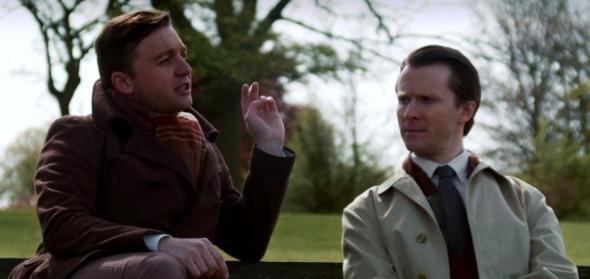Of all the cultural forms that gay men have created and elaborated since coalescing into a social group around the late 19th century, Polari, a full-fledged gay English dialect with roots among circus folk, sailors, and prostitutes, has to be one of the most fascinating—not least since it has faded along with the need for discretion and secrecy. While some words remain in common use—zhush or zhoosh (to adjust or embellish something to make it more pleasing) and trade (highly masculine or straight-acting sex partners) come to mind—the richness that we know once defined Polari is difficult to capture in 2015.
So imagine my delight when I stumbled upon Putting on the Dish, a fantastic short by London-based filmmakers Brian Fairbairn and Karl Eccleston, which shows two gay men having an exchange on a park bench, entirely in Polari. The scene takes place in the early 1960s—about the time that Polari began a rapid decline in usage, mainly due to the decriminalization of sodomy in the United Kingdom that started in 1967.
The conversation is only vaguely decipherable to this very gay viewer, so it’s probably totally inscrutable to a total outsider. Luckily, YouTube commenter Amelia Bee has offered a rough outline, which the filmmakers have approved:
Two gay men are on a bench. One comments that he doesn’t like the book Clockwork Orange. Using coded language they check to see that one another is gay before letting their guard down and speaking frankly, ogling other men as they pass by, etc. They gossip about a promiscuous mutual acquaintance that got thrown in prison after getting caught having sex with men. The one on the left then laments that he nearly got locked up himself once, after the cops came knocking right as he finished going down on a guy, but narrowly escaped by telling them there was a “poof” inside and ran as they arrested his lover. The one on the right is rightfully disgusted by this revelation and leaves.
It’s a poignant scene, made all the more so by our knowledge that this exquisite mode of communication will soon only exist in museums and preservation documents like this film.
